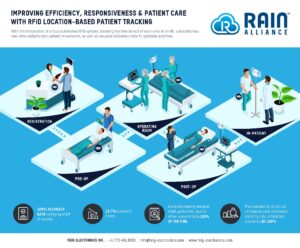Technological advancements have an ongoing impact on patient care in any contemporary healthcare environment, with Radio Frequency Identification (RFID) technology serving as a critical catalyst in streamlining processes and improving patient safety. Encompassing various aspects of healthcare delivery, including registration and inpatient care, RFID-enabled patient tracking systems provide a comprehensive solution for healthcare providers. Let’s explore the transformative role of RFID technology at different stages of the patient’s journey.
- Registration: Streamlined Efficiency and Precision
Radio Frequency Identification (RFID) technology facilitates real-time location tracking of patients within healthcare institutions. RFID technology used in patient registration enhances the overall healthcare experience. Patients are provided with RFID-enabled wristbands or identification cards embedded with unique identifiers that seamlessly interface with their electronic health records. As patients navigate through the registration process, RFID readers automatically capture and update their information, ensuring efficient and accurate data entry. This streamlined check-in experience minimizes wait times, eliminates errors, reduces administrative burdens, and establishes a positive foundation for the subsequent patient healthcare journey. By strategically positioning RFID readers throughout hospitals, clinics, and long-term care facilities, healthcare providers can monitor patient movements, and precisely track their current locations optimizing resource allocation. This real-time visibility significantly enhances staff responsiveness, maximizes overall workflow efficiency, and effectively prevents delays in patient care. - Pre-Op: Enhanced Preparedness and Personalized Care
RFID technology optimizes surgical readiness and personalized patient care during the preoperative phase. Integrating RFID tags on patient records and medical devices facilitates real-time visibility for healthcare professionals, ensuring the timely and precise completion of preoperative assessments, diagnostic tests, and preparatory measures. This proactive approach minimizes surgical delays, enhances overall readiness, and promotes patient safety by aligning procedures with individual requirements based on comprehensive data analysis. - Operating Rooms: Precision and Safety
The use of RFID technology in operating rooms has transformed surgical efficiency and safety. RFID-tagged instruments and supplies are automatically tracked and accounted for, minimizing the risk of errors during surgical procedures. RFID-enabled asset management systems ensure the prompt availability of sterile equipment, thereby optimizing surgical workflows and enhancing patient outcomes. This meticulous approach promotes surgical precision, increases safety, minimizes wastage, and adheres to stringent infection control standards, ultimately contributing to successful surgical outcomes. - Post-Op: Seamless Recovery Monitoring
Following established protocols, RFID technology is significant in facilitating post-operative care and monitoring the recovery process. RFID-enabled wristbands or tags serve as instrumental tools, enabling healthcare teams to maintain diligent oversight of patients’ whereabouts within medical facilities. These technologies also facilitate the tracking of medication administration and provide real-time insights into the progress of patients’ recovery. This proactive approach minimizes the occurrence of stockouts, reduces waste, and ensures the continuous availability of critical resources when required. As a result, using RFID technology contributes to enhanced operational efficiency and cost-effectiveness. Automated data capture and alert systems enable timely interventions, facilitating a smooth transition from surgical procedures to post-operative care. Ultimately, these measures foster optimal outcomes and contribute to the overall success of the recovery process. - Inpatient Care: Personalized Management and Enhanced Experience
RFID technology facilitates the personalized and efficient management of patients throughout the inpatient care phase. RFID-tagged medical records and treatment plans enable accurate documentation and adherence to established care protocols. RFID-enabled technology facilitates effective communication between care teams, streamlining handoffs and optimizing resource allocation, ultimately enhancing patient satisfaction and improving clinical outcomes during hospital stays.
Conclusion: Advancing Healthcare with RFID
Data acquired via RFID-enabled patient tracking systems provides healthcare organizations with valuable insights and analytics. Healthcare professionals can identify opportunities for optimization, streamline processes, and make data-driven choices to improve operational efficiency and patient outcomes by analyzing patient movement patterns, wait times, error prevention, and resource utilization. This data-driven strategy promotes ongoing healthcare delivery innovation and improvement.
RFID technology greatly enhances a patient’s general experience. Thanks to RFID-enabled systems, patients experience smoother registration procedures, shorter wait times, and enhanced communication with medical professionals. For instance, automated appointment check-ins, notifications about upcoming consultations or procedures, and individualized care based on particular needs and preferences are all made possible by RFID-enabled patient tracking.
Implementing RFID technology across the patient’s journey dramatically improves healthcare delivery by boosting effectiveness, accuracy, and patient-centered care. By using RFID-enabled patient tracking systems, healthcare providers may provide high-quality care while ensuring patient safety and satisfaction, from streamlined registration procedures to optimized surgical processes and post-operative monitoring. By embracing RFID technology’s capabilities, healthcare institutions can overcome intricate challenges and achieve excellence in patient care.

